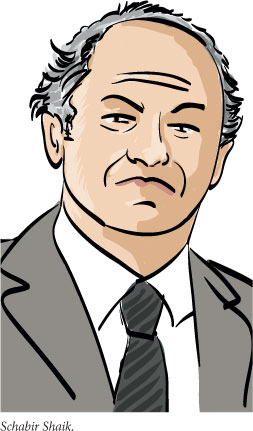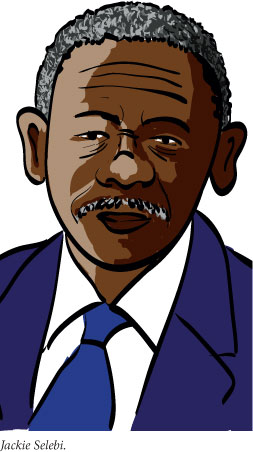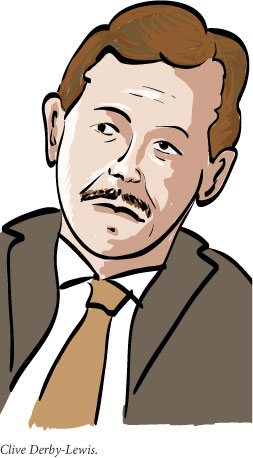Services on Demand
Article
Indicators
Related links
-
 Cited by Google
Cited by Google -
 Similars in Google
Similars in Google
Share
SAMJ: South African Medical Journal
On-line version ISSN 2078-5135
Print version ISSN 0256-9574
SAMJ, S. Afr. med. j. vol.102 n.4 Pretoria Apr. 2012
IZINDABA
Tighter medical parole -no more 'Shaik, rattle and roll'

The dozen or more GPs who will serve on the new medical parole review board can brace themselves for some seriously hard work, courtesy of a widened definition of qualifying parole conditions, but well-connected convicts hoping for compliant 'tame' medics are in for a shock.
Gone is the disproportionate weight given to the initial recommendations of a single medical officer attached to any particular prison, as is the power of any one of the individual 52 general parole boards to release or transfer an inmate on medical grounds. Instead, from 1 March this year, all applications for medical parole (now allowed on grounds of incapacitating disease and not just terminal illness) must go through the new single central Medical Parole Review Board. Set up in terms of the Correctional Matters Amendment Bill, the new body is independent of government and may call in as many expert opinions as it pleases. While the 52 general parole boards could in the past call in expert medical opinion, the system was open to abuse and selective bias, as was the influence of each prison district's medical officer. Multiple prisons' inspections by government and South African Medical Association (SAMA) officials over the past few years have also shown that very few prisons have sufficient or appropriate medical facilities for serious conditions. The probes uncovered a chorus of 'cry foul' complaints by prisoners who said politically connected individuals were receiving preferential treatment while large numbers of medical parole applications by seriously ill inmates were being overlooked.
Dr Marmol Stoltz, the newly selected Western Cape representative on the Medical Parole Board and chairperson of SAMA's General Practitioners Private Practice Committee (GPPPC), said she thought the entire system would in future be 'a lot more scientific'. 'In the past the doctor at each facility decided to board the patient and took it to the (case management) committee at the local level, who made the decision. Now anybody can apply, whether it's the patient, relatives or officials. A big part of our deliberations will be whether the inmate can be managed better at jail level, in another facility, or at home with links to emergency care. We're also going to have to draw up guidelines from scratch,' she revealed. She said that during her initial briefings of the new board members, Correctional Services Minister, Nosiviwe Mapisa-Nqakula, told them that 'every day she has to answer about Schabir Shaik' (the fraud and corruption convict and former financial advisor to President Zuma released on medical parole after serving two and one-third years of his 15-year jail term).
Members brace themselves for workload
Still reeling from the work implications but hoping the co-option of more GPs made possible by the legislation would mitigate this, she admitted, 'It was all a bit of a shock when I got the job - I was asked to send my CV in but they never told me it was perhaps so much work'. She explained that because of the lag between the old and new legislation, many medical parole applications had been purposely held back, creating a significant backlog, not to mention the widening of the qualifying medical conditions from 'terminal'. Each province must have at least one GP representative (at the time of writing Mpumalanga and Limpopo were still unrepresented), but more may be added as required. A look at the new legislation shows that each prison facility's doctor may remain involved (an outside doctor may also examine), but routes the parole application via the local prison chief. The doctor's examination and recommendation then go directly to the new medical parole board, which will be chaired by Dr Victor Ramathesele. Mapisa-Nqakula said the previous tally of 77 successful medical parole applications per year was expected to at least double.
Pressure led to new legislation
Mr Phumlani Ximiya, Acting Director of Media Liaison for Correctional Services told Izindaba: 'We're not saying this exercise won't have gaps, but we believe it's pretty watertight. There was a lot of brou-ha-ha after a person was granted medical parole and lived. People were doing a countdown and by some miracle or grace the person survived - and then they say the department's corruptible because he was allowed free. The only condition for one to get back into prison then was to commit a crime, so if you [were] terminally ill and you [were] suddenly playing golf, you'd have to commit a crime or transgress some of your medical parole conditions. This [new legislation] was the best way to strengthen the system without attracting antagonism from any party or being perceived as being corruptible.'

While he would not admit it, he was alluding to Shaik, sentenced to prison for an effective 15 years for corruption and fraud on 8 June 2005. Judge Hilary Squires found there was 'overwhelming' evidence of a corrupt relationship between Schabir Shaik and Zuma in which Shaik allegedly attempted to solicit a bribe to Zuma from Thomson CSF, a French company involved in a joint venture with Shaik's Nkobi Holdings. The joint venture tendered for, among other billion rand local contracts, the upgrading of Durban International Airport, a national identity card, road projects for the N3 and N4 highways, a third cellular telephone network and smart card technology. The fraud involved Shaik altering journal entries in the books of his Nkobi Holdings. Squires' findings led directly to the dismissal of Zuma as Deputy President by then President Thabo Mbeki two weeks later. Schabir's brother, Chippy, was at the time in charge of arms acquisition at the Department of Defence (which allowed Schabir to bid on a lucrative contract to supply Valour-class patrol corvettes to the South African Navy), and their brother, Mo, was head of National Intelligence Services.
Shaik's return from the grave
Shaik was released on medical parole on 3 March 2009 after serving two years and four months, ostensibly suffering from life-threatening severe hypertension. His brother Yunis said Schabir's body was responding less and less to hypertensive medication and that his eyes, kidneys and areas of the brain were affected, adding that their parents both died at a young age from the condition.
The head of cardiology at Inkosi Albert Luthuli Hospital in Durban, Professor D P Naidoo, discharged him in December 2008 because he was considered well enough to leave but Shaik remained in the ward until his parole. There were then several claims of him violating the terms of his parole - including staying at KwaZulu-Natal's ultra-luxury Thanda Private Game Reserve for three nights in June 2009. The Department of Correctional Services' response was that Shaik's parole officer had given him permission to recuperate at the lodge. He did however temporarily lose parole privileges as a result of a weekend newspaper article showing him shopping at a Durban shopping centre, carrying bread and magazines, and visiting residents of the luxury security estate, The Essenwoods, outside his home-confinement hours - and driving his own BMW X6. Shaik was also accused of assaulting a reporter watching him play golf during 'legitimate' parole time granted for leisure activities.

Mapisa-Nqakula said at the time of writing that neither Chris Hani murder convict Clive Derby-Lewis, nor former national police commissioner and corruption convict, Jackie Selebi, had applied for medical parole. Derby-Lewis is suffering from prostate cancer that metastasised and is serving 25 years for the murder of South African Communist Party secretary-general Chris Hani in 1993. Selebi is serving 15 years after being convicted in July 2010 of accepting money from shadowy millionaire businessman, Glenn Agliotti, himself acquitted of murdering mining magnate Brett Kebble. Selebi was treated at the Steve Biko Academic Hospital for diabetes-related kidney problems and underwent laser surgery to his eyes before being discharged to the Pretoria Central Prison hospital unit early this February. Derby-Lewis has twice been recommended for ordinary parole by the Correctional Supervision and Parole Board, but was turned down by the relevant minister in 2007 and again in August last year.
The incapacitating diseases listed by the new Act are: stage IV AIDS, severe cerebral malaria, methicillin-resistant Staphylococcus aureus and MDR/XDR TB (both despite optimal treatment). Non-infectious conditions include malignant cancer with inoperable metastases and both radiotherapy and chemotherapy failure, ischaemic heart disease with more than two ischaemic events in one year with proven cardiac enzyme abnormalities, chronic obstructive airway disease/ dyspnoea, cor pulmonale, cardiac disease with multiple organ failure, pancytopenia, end-stage renal failure, liver cirrhosis with evidence of liver failure, space-occupying lesions in the brain, severe head injury with altered level of consciousness, multisystem organ failure, chronic inflammatory demyelinating poliradiculoneuropathy, neurological sequelae of infection disease with a Karnofky score of 30% or less, tetanus, dementia and severe disabling rheumatoid arthritis. The Act says that any offender with a condition that constitutes a terminal disease or an offender who is rendered physically incapacitated as a result of injury, disease or illness 'so as to severely limit daily activity or inmate self-care', should qualify for medical parole.
Chris Bateman
chrisb@hmpg.co.za














